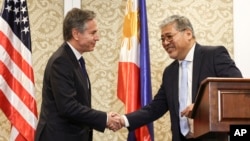U.S. Secretary of State Antony Blinken said Tuesday the United States will come to the defense of the Philippines amid rising tensions with China over disputed territories in the South China Sea.
Blinken issued the pledge shortly after arriving in Manila for talks with Philippine Foreign Minister Enrique Manalo. He said the U.S. will stand by the Philippines and “our ironclad defense commitments, including under the mutual defense treaty,” referring to the 1951 treaty that binds each nation to come to the other’s defense in the event of war.
China has claimed sovereignty over nearly the entire South China Sea, ignoring competing claims by its regional neighbors, including the Philippines, Taiwan and Vietnam.
"These waterways are critical to the Philippines, to its security, to its economy, but they're also critical to the interests of the region, the United States and the world," Blinken said.
In response to Blinken’s remarks, Chinese Foreign Ministry spokesperson Lin Jian told reporters in Beijing Tuesday the U.S. had no right to interfere in maritime disputes between China and the Philippines.
Coast guard vessels from China and the Philippines have clashed in recent weeks near disputed reefs in the South China Sea. Manila says one of its ships was damaged and four crewmen injured during a mission to deliver supplies and a fresh rotation of troops to a Philippine warship intentionally grounded on the Second Thomas Shoal to maintain the archipelago’s claims on the submerged reef.
In a second incident, a Philippines fisheries vessel was challenged by Chinese coast guard ships while it was delivering fuel to Philippine fishermen working near the Scarborough Shoal, a fisheries-rich atoll that was seized by China in 2012, despite it being inside the Philippines' 200-nautical mile exclusive economic zone.
Shortly before Blinken’s arrival in Manila, the White House announced that President Joe Biden will host a three-way summit with Philippines President Ferdinand Marcos, Junior, and Japanese Prime Minister Fumio Kishida at the White House next month.
White House Press Secretary Karine Jean-Pierre said the three leaders will seek “a shared vision for a free and open Indo-Pacific.”





